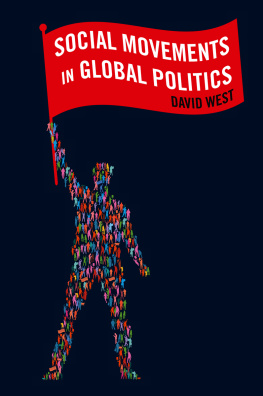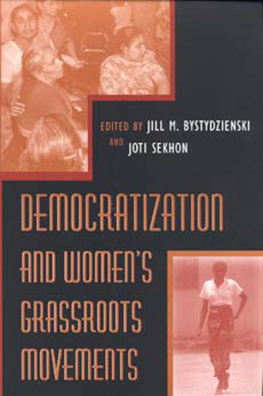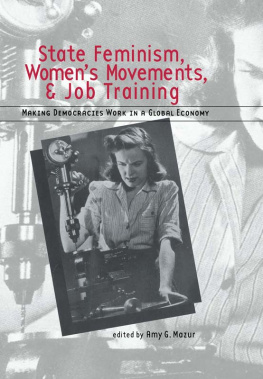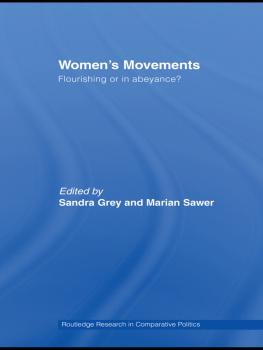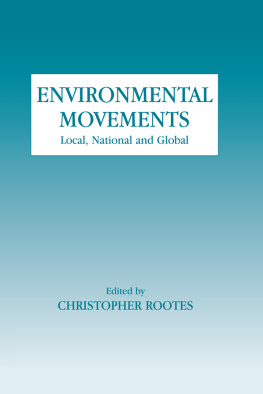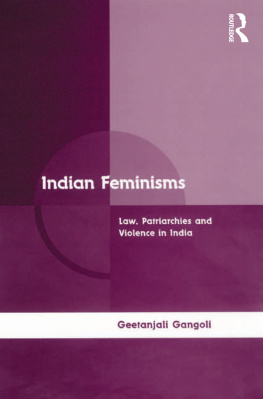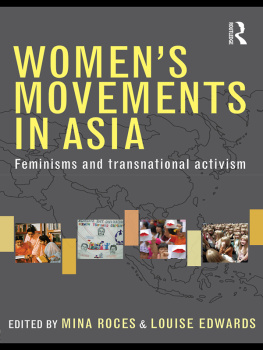Acknowledgments
This book, like its predecessor, The Challenge of Local Feminisms, received generous support from the Ford Foundation, which has demonstrated extraordinary commitment to womens studies and womens movements. When I spoke to Alison Bernstein about this book, she responded with characteristic enthusiasm and generosity. I am deeply grateful to her and to Sheila Devaney for shepherding this project to completion. I am also thankful to Amherst College for providing the resources and environment that have made this bookand all my workpossible.
Alex Masulis encouraged me to consider this book and he and Sandra Beris made it happen. Julie Ajinkya provided enormous help in the early stages, Nora Lawrence and Amy A. Ford as the project continued. I could not have completed the book on time without Andrew Haltermans energetic and responsible assistance.
My feminist political scientist friends and fellow travelers, Martha Ackelsburg, Cynthia Enloe, Mary Katzenstein, Eileen McDonagh, and Molly Shanley, offered helpful comments on the Introduction. Sonia Alvarez, Elisabeth Jay Friedman, Mark Kesselman, Sayres Rudy, and Lisa McIntosh Sundstrom also provided valuable advice.
The fifteen years since The Challenge of Local Feminisms was published have been a period of enormous personal change. My sons, Ishan and Javed, have grown into impressive young men. I have lost my remarkable brother-in-law, Rob Borsellino; inspiring uncle, Patwant Singh; and extraordinary father, Romen Basu. My sister Rekha has provided levity and solace in the hardest of times. Other family members, Romen, Raj, Meher, Judy, Rebecca, Jonathan, Saida, and Elijah have made life meaningful and fun. Mark graces my life and work with his vitality, intelligence, and devotion. My mother Rasil introduced me to global feminism through her work at the United Nations and deepened my understanding of local feminism through her work with Ekatra. She has taught me about the importance of sustaining feminist commitments over time and space. This book is inspired by her example and dedicated to her with love and gratitude.
Selected Bibliography
Abrahamian, Ervand. 1982. Iran between two revolutions. Princeton: Princeton University Press.
Abubikirova, N. I., T. A. Klimenkova, E. V. Kotchkina, M. A. Regentova, and T. G. Troinova. 1998. Spravochnik: Zhenskie nepravitelstvennye organizatsii rossii i SNG [Directory: Womens NGOs in Russia and the CIS]. Moscow: Womens Information Network.
Abu Khadra, Salwa [head of the General Union of Palestinian Women, General Command]. 2001. Interview with Islah Jad, Ramallah, July 11.
Abul-Omrein, Khaled. 2000. Hamas: Harakat al-moqawameh al-islameyya fi falastine [Hamas: The Islamic resistance movement in Palestine]. Cairo: Marqaz al-Hadara al-Arabeyya (the Arab Civilisation Center).
ActionAid. n.d. Rotten fruit: Tesco profits as women workers pay a high price. http://www.wfp.org.za.
Afary, Janet. 1996. The Iranian Constitutional Revolution, 1906-1911: Grassroots democracy, social democracy, and the origin of feminism. New York: Columbia University Press.
. 2009. Sexual politics in modern Iran. Cambridge: Cambridge University Press.
Afkhami, Mahnaz, and Erika Friedl, eds. 1994. Eye of the storm: Women in post-revolutionary Iran. London: I. B. Tauris.
Afshar, Haleh. 1998. Islam and feminisms: An Iranian case study. New York: Macmillan.
Agarwal, Bina. 1997. Bargaining and gender relations: Within and beyond the household. Feminist Economics 2, no. 1: 1-50.
Agnes, Flavia. 1994. Womens movement in a secular framework: Redefining the agendas. Economic and Political Weekly, May 7, 1123-1128. Reprinted in Womens studies: A reader, ed. Mary E. John, 501-508. New Delhi: Penguin Books India, 2008.
Ahmadi Khorasani, Noushin. 1386/2007. Jonbesh yek million emza: Ravayati az daroun [The One Million Signatures movement: A narrative from inside]. http://www.femschool.info/campaign/spip.php?article86.
Aidi, Guo. 2009. Nuganbu yanchi tuixiu tiaokuan bei shanchu [Elimination of clauses on extension of retirement of women executives]. China Womens New Daily. http://news.xinhuanet.com/legal/2009-05/05-content_11313716.htm.
Aivazova, Svetlana. 1998. Russkie zhenshchiny v labarinte ravnopraviia [Russian women in the labyrinth of equal rights]. Moscow: RIK Rusanova.
. 2000. Zhenshchina i vlast: Liubov bez vzaimnosti [Women and political power: Unrequited love]. Zhenshchina Plius 1.
Alamdari, Kazem. 1387/2008. Jonbesh yek-million emza, ulgouyi bara-ye jamh madani dar Iran. 10 Farvardin/March. http://www.femschool.info/campaign/spip.php?article210.
Alarcn, Norma. 1990. The theoretical subjects of this bridge called my back and Anglo-American feminism. In Making FACES/MAKING Soul: Haciendo caras, ed. Gloria Anzalda. San Francisco: Aunt Lute.
Alasti, Sanaz. 2007. Comparative study of stoning punishments in the religions of Islam and Judaism. Justice Policy Journal 4, no. 1 (Spring).
Alexander, M. Jacqui, and Chandra Talpade Mohanty, eds. 1997. Feminist genealogies, colonial legacies, democratic futures. New York and London: Routledge.
Alvarez, Carmen. 2000. Cosmovisin maya y feminismos: Caminos que se unen? In La encrucijada de las identidades, mujeres feminismos y mayanismos en dilogo, ed. Aura Estela Cumes and Ana Silvia Monzn, 19-31. Guatemala City: Serviprensa.
Alvarez, Sonia E. 1990. Engendering democracy in Brazil: Womens movements in transition politics . Princeton: Princeton University Press.
. 1994. La (trans)formacin del (los) feminism(s) y la poltica de gnero em la democratizacin del Brasil. In Mujeres y participacin poltica, ed. Magdalena Leon. Avances y desafios em Amrica Latina. Bogot: Tercer Mundo.
. 1998a. Advocating feminism: The Latin American feminist NGO boom. Conference made at the Latin American Studies Program, Mount Holyoke College, on May 2, 1998. http://www.mtholyoke.edu/acad/latam/schomburgmoreno/alvarez.html.
. 1998b. Latin American feminisms go global: Trends of the 1990s and challenges for the new millennium. In Cultures of politics/politics of cultures: Revisioning Latin American social movements, ed. Sonia E. Alvarez, Evelina Dagnino, and Arturo Escobar. Boulder: Westview Press.
. 2000. Translating the global: Effects of transnational organizing on local feminist discourses and practices in Latin America. Meridians: Feminism, Race, Transnationalism 1, no. 1 (Autumn): 30-31.
Alvarez, Sonia E., Nalu Faria, and Miriam Nobre. 2004. Another (also feminist) world is possible: Constructing transnational spaces and global alternatives from the movements. In The world social forum: Challenging empires, ed. Jai Sen, Anita Anand, Arturo Escobar, and P. Waterman, 199-206. New Delhi: Viveka.
Alvarez, Sonia E., Elisabeth J. Friedman, Ericka Beckman, Maylei Blackwell, Norma Chinchilla, Nathalie Lebon, Marissa Navarro, and Marcela Ros Tobar. 2003. Encountering Latin American and Caribbean feminisms. Signs: Journal of Women in Culture and Society 28, no. 2: 537-579.
AMBARTICULAO de mulheres brasileiras. 2004. Articulando a luta feminista nas polticas pblicas. Recife: [s.n.]. (Texto para discusso.)
American Anthropological Association. 1947. Statement on human rights. American Anthropologist 49: 539-543.
Amin, Samir. 1989. Eurocentrism. Trans. Russel Moore. New York: Monthly Review Press.
Antrobus, Peggy. 2004. The global womens movement: Origins, issues, and strategies. London: Zed Books.
Aptheker, Bettina. 1989.


